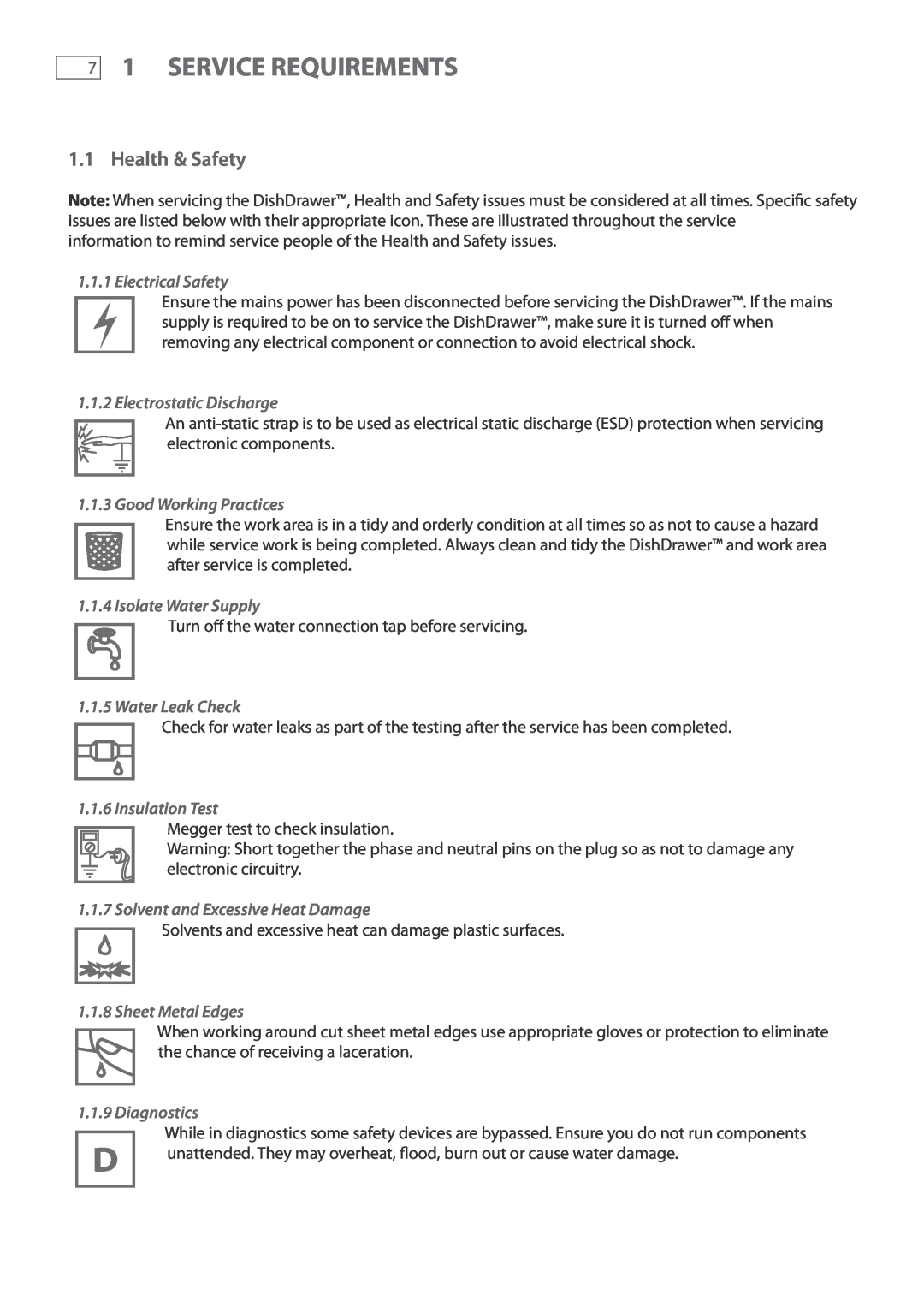DD607 & DD247
Service Manual
DishDrawer
NZ AU GB IE US CA
Description
FEATURED PRODUCT & CONTACT ADDRESSES
Brand
Standard Double Models
Tall Tub Double Models
Standard Single Models
DD24SCW7
Single, Designer, Brushed Stainless
Single, Tall Tub, Classic, Stainless Steel
Tall Tub Single Models
DD24SDFTX7
Single, Tall Tub, Classic White
CONTENTS
SERVICE PROCEDURES
WIRING DIAGRAMS
10 NOTES
1.1.2 Electrostatic Discharge
1 SERVICE REQUIREMENTS
1.1.1 Electrical Safety
1.1.9 Diagnostics
1.2.1 Static Strap
1.2 Specialised Tools
22 15/16 ”
2 DIMENSIONS & SPECIFICATIONS
22 15/16”
Component
Component Specifications
Specification
8.0 Ohms per winding, 16 ohms phase to
Hall sensor
Time
Wash Cycle
Wash
Post
Wash
DD60 Australia/New Zealand Wash Profiles
DD60 United States/Canada Wash Profiles
Wash Cycle
3.3.1 Tub Home Sensor
3 TECHNICAL OVERVIEW
3.3.3 Wireless Remote some integrated models only
3.3.2 Touch Switches
3.3.4 Operation some integrated models only
3.4.1 Rotor
3.3.5 Wireless Receiver
Air Valve
Sluicing Jets
3.4.4 Drain Filter
3.4.3 Filter Plate
3.5.2 During a Power Failure
3.5.1 When Activated
3.7.1 Water Inlet
3.7.4 Flood Protection
3.7.2 Dispensing Detergent and Rinse Aid
3.7.3 Amount of Water
Flood Sensor
3.8.4 Over Heat Protection
3.8.1 The Heating Element
3.8.2 Heating the Water
3.8.3 Maintaining the Temperature
Non Return Valve
3.11.1 The Filter System
3.11.2 Removing and Cleaning the Drain Filter and Filter Plate
3.12.1 Integrated Single Drawer Venting some models only
Strainer Spigot Strainer
Setup
4 OPTION ADJUSTMENT MODE
Not Wireless Model
4.1.2 Rinse Aid Setup rA
Parts per Million
DishDrawer Setting
4.1.3 Water Supply Hardness Setup hd
Grains per Gallon
4.2.2 Designer Models
4.2.1 Classic Models
4.2.3 Integrated Models
4.2.4 Integrated with Wireless Remote Control
button, which will increase or decrease the amount of LED’s on the
Water softener
Closed Drawer autolock using the remote control
Option
Rinse aid
5.1.1 Display Mode
5 DIAGNOSTICS
5.1.2 Hardware Output Mode HO
Rinse Aid Pump operates as a valve for diagnostic purposes only
5.1.4 Continuous Cycle Mode CC
5.1.3 Fast Cycle FC
5.1.6 Show Off/ Showroom Wash Mode
5.1.5 Temperature and Voltage Display
Playing Tunes
5.2.2 Display Mode
5.2.1 Diagnostic Mode
Program Indicators
Program Button
5.2.5 Continous Cycle Mode CC
5.2.4 Fast Cycle Mode FC
6 FAULT CODES AND POOR PERFORMANCE
Possible Causes
Fault Code
Fault
LED Display
6.1.1 Sub Code Faults
Fast & Eco LED’s
Fast, Delicate
plastic items not drying?
Poor Dry Performance Non Vented
QUESTION
Is the customer complaining of
Customers Complaint - coffee/tea stains left in cups
How to resolve the
problem
Customers Complaint - food particles left on dishes
More on next page
white chalky film on them
How to resolve the problem
7.1 Fault Code Problem Solving
7 FAULT FINDING PROCEDURE
Wet E1- Water in the Chassis Base
DO NOT REPLACE COMPONENTS ON A TUB WITH THIS WARNING
Dry E1 - No Water in the Chassis Base
Prefinished models
Controller Harness P201 Corrosion Damage Example
Fault code E2 - Sub Code 03 - Motor Not Drawing Enough Current
NOTE For more detailed component testing, refer to page
Fault Code E5 - Sub Code 04 - Not Stalling
Fault Code E5 - Lid Fault
Fault Code E5 - Sub Code 01 - Not Starting
Fault Code E5 - Sub Code 02 - No Current
Flap
Fan Housing Locking Tabs
Detergent Diverter Coil Harness Pin Pin
Fault Code E7 - Detergent Diverter Valve
Fault Code E7 - Sub Code 02 - Under Current
Fault Code E7 - Sub Code 03 - Over Current
Water softener brine pump
There are 4 sub codes which relate to this fault code
If the problem persists replace the bottom controller
8.2 Power Distribution Concept
8 WIRING DIAGRAMS
8.3 Wiring Diagram
Lower Tub Shown Only
P202
9 SERVICE PROCEDURES
P204
P203
1. Open the drawer
Clip Cowling
Retaining Screw
Rail Clip
1. Open the drawer and remove the drawer front refer section
1. Remove the drawer front refert section
1. Remove the cutlery basket and rack from the tub
1. Remove the drawer front refer Section
Clips Clips
Earth Wire Element Cover
Drain Hose Fill Hose
1. Remove the wiring cover refer section
1. Remove the tub as per section
Trim Channel
Trim
Water Valve
Hex Drive Screws Rail Rear Locating Tabs
Clips Inlet Hose Flood Sensor MFB
Fill Hoses Water Inlet Hose Chassis Clip
Wiring Harness Link Clip 15mm 3/4”
Slide Off Tub
9.28 Single Integrated Vent Duct Removal Some models only
Trim Clips
T10 Torx Screw
1. Remove the tub to gain access to the duct, refer section
1. Remove the door panel, refer section
Receiver Replacement Procedure
Pairing Procedure
To Pair Remote to Receiver
Transmit LED indicator Top Tub start button on doubles
10 NOTES
11.2011
NZ AU GB IE US CA F&P PN 590409 A
